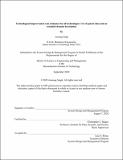Technological improvement rate estimates for all technologies: Use of patent data and an extended domain description
Author(s)
Singh, Anuraag, S.M. Massachusetts Institute of Technology.
Download1263347052-MIT.pdf (1.759Mb)
Other Contributors
Massachusetts Institute of Technology. Engineering and Management Program.
System Design and Management Program.
Advisor
Christopher L. Magee.
Terms of use
Metadata
Show full item recordAbstract
Complex and highly interdependent socio-technical systems are necessary for sustaining, governing, entertaining and nourishing human society. Such systems fulfill their objectives by incorporating ever-improving technologies. A systematic understanding of technology and the pace of technical change is thus critical for policymakers and stakeholders to make well-informed decisions and avoid costly mistakes and omissions. This work reviews past work on technological forecasting and decision making and builds on new research to introduce a systematic approach to technological decision-making. This document describes why information about technology improvement rates matters to technological decision-making, the theoretical framework for doing so, a repeatable methodology and an online system making available this capability to stakeholders. Despite and somewhat because of the complexity of the "whole" socio-technical system, the regularity of constant annual performance improvement is a very strong empirical fact with substantial theoretical underpinning. This regularity lies at the heart of integrating objective data into overall decision processes concerning items affected by the timing of technological change. The methodology uses a broad, easy to use, database of the rates of technological change that covers almost all technologies. We do this by using prior work (accomplished as part of the effort that enabled this thesis) establishing a correspondence of 97.14% of all patents within the entire US patent system to a set of 1757 technology domains and estimating their rates of improvements. We describe the development of a new web-based technology search tool and apply the methodology to a case study of the automotive industry. We believe these results herald a new era of data-driven technological decision-making. Using this new framework and the tool, stakeholders can make timely and "good enough" technology forecasts available without requiring extensive modelling initiatives.
Description
Thesis: S.M. in Engineering and Management, Massachusetts Institute of Technology, System Design and Management Program, September, 2020 Cataloged from the official version of thesis. Includes bibliographical references (pages 54-58).
Date issued
2020Department
Massachusetts Institute of Technology. Engineering and Management ProgramPublisher
Massachusetts Institute of Technology
Keywords
Engineering and Management Program., System Design and Management Program.